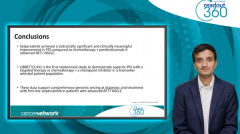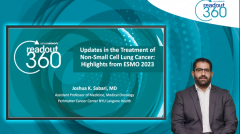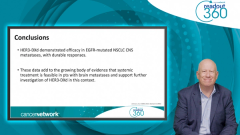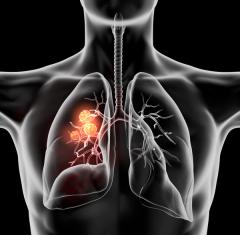
MARIPOSA-2: Amivantamab, Lazertinib, and Chemotherapy in EGFR-Mutated Advanced NSCLC
Alexander I. Spira, MD, PhD, FACP, reviews recent data from MARIPOSA-2 looking at amivantamab plus chemotherapy, with or without lazertinib, in EGFR-mutated advanced NSCLC.
Episodes in this series

This is a synopsis of a Readout 360 series featuring Sandip P. Patel, MD, of UC San Diego Moores Cancer Center; Joshua K. Sabari, MD, of NYU Langone’s Perlmutter Cancer Center; and Alexander I. Spira, MD, PhD, FACP, of Virginia Cancer Specialists.
Alexander I. Spira, MD, PhD, FACP, from Virginia Cancer Specialists and US Oncology Research, discussed updates in the treatment of non-small cell lung cancer (NSCLC) from the European Society for Medical Oncology (ESMO) 2023 conference. The first abstract he presented was the MARIPOSA-2 study by Dr. Passaro and colleagues, which evaluated amivantamab plus chemotherapy with or without lazertinib versus chemotherapy alone in EGFR-mutated advanced NSCLC after progression on osimertinib.
Amivantamab, an EGFR-MET bispecific antibody with immune cell-directing activity, and lazertinib, a CNS-penetrant third-generation tyrosine kinase inhibitor (TKI), have demonstrated antitumor activity in phase 1 clinical studies. The MARIPOSA-2 study included patients with advanced NSCLC harboring EGFR exon 19 deletions or L858R mutations who had progressed on prior osimertinib therapy. Patients were randomized to three arms: carboplatin plus pemetrexed plus lazertinib plus amivantamab, carboplatin plus pemetrexed plus amivantamab, or carboplatin plus pemetrexed alone. The primary endpoint was progression-free survival (PFS) by blinded independent central review.
At the data cutoff, with a median follow-up of 8.7 months, PFS was improved in both amivantamab-containing arms compared to chemotherapy alone. The hazard ratio for amivantamab plus chemotherapy versus chemotherapy alone was 0.48, and for amivantamab plus lazertinib plus chemotherapy versus chemotherapy alone, it was 0.44. The median PFS was 6.3 months in the amivantamab plus chemotherapy arm, 8.3 months in the amivantamab plus lazertinib plus chemotherapy arm, and 4.2 months in the chemotherapy-only arm. The overall response rates were 64%, 63%, and 36% in the amivantamab plus chemotherapy, amivantamab plus lazertinib plus chemotherapy, and chemotherapy-only arms, respectively.
Although immature, the overall survival hazard ratio was 0.77 for amivantamab plus chemotherapy versus chemotherapy alone and 0.96 for amivantamab plus lazertinib plus chemotherapy versus chemotherapy alone. The median intracranial PFS was 12.5 months in the amivantamab plus chemotherapy arm, 12.8 months in the amivantamab plus lazertinib plus chemotherapy arm, and 8.3 months in the chemotherapy-only arm.
The predominant adverse events in the amivantamab-containing arms were hematologic, EGFR-related, and MET-related, consistent with previous studies such as CHRYSALIS. The amivantamab plus chemotherapy arm had lower rates of hematologic adverse events compared to the amivantamab plus lazertinib plus chemotherapy arm.
Dr. Spira concluded that amivantamab plus chemotherapy and amivantamab plus lazertinib plus chemotherapy improved PFS, overall response rates, and intracranial PFS compared to chemotherapy alone in EGFR-mutated advanced NSCLC after progression on osimertinib. These regimens may represent a new standard of care in this setting.
*Video synopsis is AI-generated and reviewed by Cancer Network editorial staff.
Newsletter
Stay up to date on recent advances in the multidisciplinary approach to cancer.








































